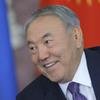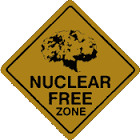(AFP) — McGlinchey: A desire to be accepted abroad has led Nazarbayev to pursue a "less brutal and pernicious" form of authoritarianism. — (Kazakhstan) A shepherd's son who counts former British prime minister Tony Blair and Russian President Vladimir Putin among his admirers, Kazakhstan's Nursultan Nazarbayev has overseen two decades of change in his Central Asian country, while remaining entrenched himself.
Under Nazarbayev, the sprawling nation of 17 million has parlayed its energy resources and strategic location into influence, emerging from ex-Soviet obscurity to host Iranian nuclear talks and chair the Organization for Security and Cooperation in Europe. The gleaming futuristic new capital Astana, built in the years since independence, symbolises Nazarbayev's drive to put the country on the map. […]
"Kazakhstan's state institutions are fairly hollowed out," says Edward Schatz, an authority on Kazakhstan at the University of Toronto. "Parliament is a legislature only in name. The judiciary lacks independence."
A desire to be accepted abroad has led Nazarbayev to pursue a "less brutal and pernicious" form of authoritarianism than leaders such as Uzbekistan's Islam Karimov, said Eric McGlinchey, a Central Asia expert at George Mason University. In 2011, however, a pay dispute in the oil sector turned violent with government troops shooting dead 15 protesters and injuring over a hundred. "This was a black eye for the government and Nazarbayev personally. He knows if he wants to present himself as a purveyor of international peace, this is a mistake that cannot be repeated," said McGlinchey.
Read More © AFP/Yahoo News











